Cordless Drill Battery Articles
https://www.drill-batteries.com
A Guide to Comparing 18V Power Tool Batteries
Today i`m going to have a bit of a chat about cordless tool batteries, particularly 18v batteries since that`s what most people are using and because a battery is not just a battery anymore and customers constantly ask me which are the best. So hopefully this will help at least one person out there who is wondering from a technical point of view which battery has the best advantages.
Anything written here is just intended to help my customers make a more informed decision as to which system they want to go with. Nothing more and nothing less. I`m a makita LXT user myself but i try to be as unbiased as possible, so your welcome to take it or leave it. My opinion comes from 20 years as a carpenter and several years of running a high turnover Tool Store. So i have a pretty good idea of what i`m talking about.
We are in the age of smart batteries now and the new batteries on offer from different companies have pros and cons that need to be looked at in a little detail, since the battery is a very important part of the system and they arn`t cheap.
Ok so let`s as quick as we can take a look at the 4 main players in the market and what they offer.
Dewalt, Makita, Milwaukee and Hitachi.
Those 4 Manufacturers batteries can be easily split into two groups,
Those with smarter batteries and those without.
What`s a smart battery?
That`s what we call batteries that have a good form of voltage, current, heat, & overload protection for the li-ion cells inside.
Why do you need that & why is that important?
To put it simply the heat limit of a li-ion battery is only 50 degrees C versus the older ni-cd batteries that handled 75 degrees before taking damage and NI-MH that handled 65C. So there is a big issue with damaging li-ion batteries in power tools by getting them too hot. Fast discharges in high load tools really heats them up. So a battery having protection against over heating is a big deal if you want to get a good lifespan from a li-ion battery.
Or alternately having a tool that can fit ni-cd batteries and li-ion batteries to give you options is also a good idea. So here`s where we get to the 2 groups of normal versus smart batteries
Dewalt & Makita:
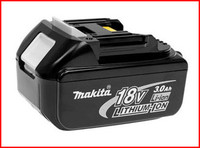
Makita currently uses sony cells in the BL1830 & BL1815 LXT Makita batteries and these are the biggest seller in the market by far. They are regarded as one of the best conventional li-ion cells available and are very reliable. Makita batteries have a very low fault rate straight out of the factory and it`s very unusual for me to see a battery that won`t charge out of the factory or that dies after only a few cycles.
The problem with these Makita batteries is that they don`t switch off and stay off of when they get too hot or over discharged. They may switch some of the tools off when they get too hot but it`s usually just a matter of switching it back on and it will start again. The battery doesn`t stay switched off like some of the other brands do now. Most people simply don`t realise the battery is to hot and try to keep using it. That`s how they take damage. These batteries can also be discharged to the point of death, it will not switch off once it gets too flat and that can prevent a battery from being recharged again. If it gets too flat to run the protection circuit inside the battery it can trip the fire protection switch designed to stop the battery from exploding when being recharged and from there that`s it you`ve got a dead battery that won`t recharge in the charger.
Yes they can explode & make quite a big bang if they do. I`ll put it too you this way if a li-ion battery ever starts smoking in your hand and you want to keep your hand, then you`d want to quickly throw that battery as far away as possible.
The LXT batteries have been on the market for a while now and the technology is getting outdated it does offer some protection but it`s not enough in my opinion. Other companies have released batteries with better protection, making them more idiot proof. Makita users need to manage heat in their batteries or they will destroy batteries with in a year or two with over heating and over discharging issues. Hence why i don`t think they are the best tool battery.
By the way, i love makita gear so i`m trying to be unbiased, i own Makita LXT gear myself & most of my own tools are Makita & Hitachi tools that i`ve had for 10-20 years. For those of us who know about how to treat a li-ion battery the right way the over heating & over discharging issue isn`t a problem. Since i cycle my batteries regularly and the problem is solved, it`s simply a matter of changing the way you use tools and batteries. I never cook my makita batteries and try to top them up rather than giving them a full cycle in the charger. Since one full cycle from dead flat equals about 6 half charges in wear & tear on the battery. Wear & tear dramatically increases as the battery gets flatter and flatter before being recharged. So part charges are the way to go and that also prevents any over heating issues. I always try to charge all my li-ion batteries when they are half flat whether they are tool batteries or even just my laptop & phone batteries.
But for people who don`t know, they can severely damage Makita li-ion batteries by over heating & over discharging them. The makita LXT battery doesn`t protect itself well enough in my opinion. It`s well over due for an updated more idiot proof version.
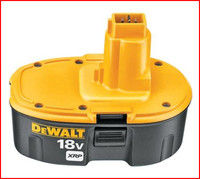
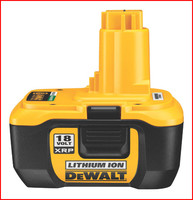
Dewalt has by far some of the best options available in my opinion for those guys who really work tools hard and work in high temperatures. Why? Well with the Dewalt XRP tools you can still use the DC9096 yellow top Ni-cd battery and also the new li-ion batteries in the same tool. The base accepts either type of battery and that`s a really big bonus.
Since ni-cd xrp batteries are pretty much still the best Dewalt battery for a high load power tool in hot weather and one of the best batteries ever made it`s great to be able to use both. What i tell most customers is that if your buying a Dewalt li-ion combo it`s great to have an older ni-cd battery or 2 as well. So when it comes to time to get a battery into something like a circular saw or grinder and flatten it in 10 minutes you use your Ni-cd battery, rather than doing damage to your li-ion battery. Especially when it`s really hot outside. It`s quite easy to get a battery to 50 degrees but quite difficult to exceed the 75 degree heat level of the old DC9096 XRP Ni-cd`s. Even though there`s lots of advantages to a li-ion battery you still can`t get past the fact that they take damage after 50 degrees and the faster they get discharged the shorter the lifespan of the battery will be. When your using li-ion in a cell phone it`s no issue but in a power tool that drains batteries in 10 minutes heat is a big issue.
Don`t get sucked into the way Dewalt advertise the XRP li-ion batteries either they don`t compare apples to apples. When Dewalt says the Li-ion DC9180 gets 4 times the recharges of an average Ni-cd battery you have to remember that`s not comparing it to an XRP Ni-cd dewalt battery, they get almost double the cylces of an average ni-cd battery cell. Average Ni-cd cells get 500 charges & XRP Dewalt cells pull 900 or more are very difficult to get a memory in and have a shelf life of about 6 years. So in reality an XRP li-ion battery might last twice as long as an XRP ni-cd but it costs twice the price and if you don`t look after it properly it won`t last longer at all. Where as the XRP Ni-cd will generally take a licking and keep on ticking. Tried & proven since 1996 as being very hard to destroy.
It`s not uncommon for a customer to come in with a DC9096 Ni-cd that is 6 or 7 years old and from their original kit and is only now just starting to die. So hence why i regard the DC9096 as the worlds best battery for guys who really work tool batteries hard and want a bullet proof battery. Of course it`s heavier and discharges itself way quicker when sitting around than a li-ion battery and under the right conditions the li-ion will get more recharges if they get treated well. Add to that the advantage of constant power you get from a li-ion battery and that`s why companies swapped to li-ion to power their tools now.
Dewalt chose to go with a nano phosphate chemistry that would be more inclined to handle the abuse of a power tool in the XRP li-ion batteries but they still suffer from the same effects that any li-ion cell suffers from. I don`t believe they achieved their goal with the A123 li-ion cells that are in the new batteries and they stretch the truth a little in some respects when answering questions about those on their website and from customers reports they are killing batteries that get worked hard in 12 months to 2 years, just like other li-ion users that work the batteries hard. Rumour has it that Dewalt will swap to samsung cells at some stage who have started to make phosphate chemistry cells similar to the A123 cells that dewalt has been using. The DC9180 and DC9181 batteries are meant to shut down if over discharged or overheated. The only things i find disappointing is the lack of a fan in the charger and the lack of any venting in the battery casing on those batteries. Dewalt`s answer is that a fan in the charger won`t help a battery that has been already over heated, this is true but what it does do is make the battery a bit cooler while it`s charging. Since you might want to put it into a tool shortly after charging the lower the temperature of the battery after charging the better. They kind of contradict themselves a bit in advertising, in one answer they`ll say don`t charge or use a battery in temperatures above 40 degrees, and in other answers they`ll say exceeding the batteries heat range won`t cause damage. I can tell you it will and you really have to be care full.
Also as a note never leave Li-ion batteries in places like a toolbox in the back of your ute in the hot summer sun. The battery will be exposed to high temperatures for long periods of time and will take significant damage and cycle loss. That can be worse than overheating them in tools since the exposure time to excess heat levels will be much greater.
Dewalt claim XRP ni-cd batteries average 900 cycles and XRP DC9180 Li-ion 2000 cycles.
Dewalt is just about to release the new XR range which should have some of the best run times and power management seen yet. With a combination of smart technology in the tools and batteries to manage the way the battery performs.
I`ll do a separate guide on that when i get time, but needless to say the XR tools will be something to keep your eye on. But keep in mind none of the existing range of XRP tools will be compatible with the new XR Range. It`s a whole new system with slide type batteries similar in style to makita and Milwaukee`s batteries.
MILWAUKEE & HITACHI BATTERIES
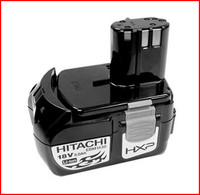
Hitachi EBM1830 HXP Li-ion batteries use the same sony cells as the Makita BL1830 Battery but these batteries are smarter batteries than the LXT batteries. The main feature of these batteries is that they switch off if they get too hot, over dis-charged or over charged making these one of the most reliable and longest lasting batteries on the market. Hence why they are called smart batteries. The HXP battery monitors each cell individually ensuring that no cell gets too hot, too flat or over charged. Which makes these batteries way more idiot proof than dewalt or Makita batteries. They can`t be damaged by over heating because they simply switch off and stay off, until it cools down and the battery is happy again. It also switches off if it gets too flat and you can`t use the tool anymore. The battery can`t be used again until it`s recharged. That`s also important because Li-ion batteries can be flattened to the point of no return and should never be run until dead flat. Also the flatter the battery is when it`s recharged the higher the wear and tear is on the battery while it`s being recharged as i explained above. So it`s way better to charge those before they are flat. That`s a big bonus.
As another side note, don`t flatten a battery and then leave it in storage for long periods. You really should charge them before you store them. The circuits inside the battery use a small amount of current and if the battery goes really dead flat and can`t provide power to that circuit, the battery will shut down permanently and will not recharge. As mentioned above the fire switch will trip. Hence it`s good to remove the batteries from tools also to prevent a trigger from being accidentally held down in a tool box or something.
All in all these batteries have been tried and proven. They have been around for a fair while and i rarely see a Hitachi battery with a fault whether it`s straight from the factory or returns. I also rarely here of customers that have one of these batteries die after 12 months or 2 years and i`m positive that the protection switching is the main reason for that.
One of the other good parts about these particular batteries is that they are like dewalt batteries and they retro fit most of the older tools that hitachi have been making for the last 10 years. So a lot of people that bought a ni-mh drill kit can just go and grab a couple of new batteries and a li-ion charger and upgrade their old drill or tool.
Hitachi Claim these batteries average 1500 cycles.
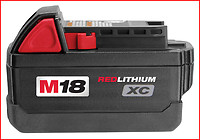
Well and so we get to what in my opinion is currently the best battery on the market. The Milwaukee Red Lithium Battery.
Why do i think that?
Well before the red lithium battery came out the older XC standard li-ion M18 battery was right up there with the best it already had digital power management that monitored each individual cell just like the hitachi battery and switched off if a cell got over heated, over discharged or over charged. It also manages the way the battery discharges itself to help prevent anything bad happening. So it was pretty much the best battery out there.
Now Milwaukee have released the Red Lithium version which is basically without going into too much technical stuff a different type of cell chemistry from samsung that can handle much lower temperatures, they run 20% cooler, get 40% more run time, get 20% more power & 50% more recharges than other conventional li-ion batteries, combined with a more advanced digital power management system.
That`s some pretty big claims they make in the advertising speech. Honestly though the M18 Red lithium batteries are new to the market so only time will tell if all of those claims are true. With the Hitachi, Dewalt and Makita batteries they have all been around long enough to see exactly what happens to them over time and how well they handle peoples abuse. I guess we`ll see in a year or two how many guys have killed the new Red Lithium M18 Batteries or if we are only hearing about a few dead batteries. So far the current XC M18 battery seems to be very reliable and it`s quite rare for us to hear that a customers M18 battery has failed prematurely. Once again the protection circuit has a lot to do with that. I have seen the odd battery here and there that will fail to charge when it`s brand new, but not a lot.
All in all the new Milwaukee Red Lithium M18 battery stacks up to be the best on paper and should perform in a tool better than most others and also pull more recharges than most others. That`s on paper though, as i say only time will tell in the real world. I also havn`t had a chance to see how these stack up against the new Dewalt 20V max batteries in a tool and see how the run times really are under load, side by side. I`ll get to that when i get some spare time.
Milwaukee are not clearly advertising the average amount of cycles obtained from these batteries at the moment, which makes me a bit skeptical straight away as to whether or not the claims of 50% more recharges from Red lithium are real or not. I`d like to see a clear figure of 3000 or so average cycles to support the claims or at least them state exactly what type and brand of cell they are using as a comparison when they use the phrase "compared to conventional li-ion cells". It`s pretty vague to say they just get 50% more charges than a "conventional" li-ion cell. Brands of Conventional cells really vary, some get 500 cycles, some get 1500, depending the brand. So how do they compare to a sony cell that makita and hitachi use? Well who knows and that`s exactly my point. It`s not even clear how they rate versus the older XC high capacity battery which was a very, very good battery anyway. So we`ll have to wait and see how they go in the real world under job site conditions to really see.
So a battery is not just a battery and with Li-ion batteries you do need to treat them properly to get a chance at getting the average number of cycles out of them before they fail. As you can see some brands are currently more idiot proof than others. But the life of the battery will always really be effected by what the user does to the battery. Batteries that are constantly discharged rapidly, always ran until dead flat, stored in hot places like tool boxes in the back of utes or any other abuse will never get a great lifespan. Like i say the lifespan of a li-ion battery gets determined by the users behavior.
So to get a bit more technical, every company uses different cells and every companies cells are different.
Some of the same identicle cells used can be found inside other cheaper brands of batteries.
Also as a Note: I see lots of cheap replacement packs being sold for makita, hitachi, dewalt and milwaukee tools, and so here`s the truth about those. The cheap imported no label replacement batteries from China that look like they are Genuine but without a label or perhap a slightly different coloured casing, usually have poor cells in them that will average about 60% of their original capacity after about 700 cycles.
How do i know that for certain?
Simply because as a distributer we are privy to seeing suppliers Lab test results and i`ve asked some of the companies that make the aftermarket batteries in china to show me the test data for the cells they use and the results were not great in comparrison to the higher quality cells used by other companies. So i`ve actually seen first hand in detail the 20 odd pages of lab tests results for the li-ion cells that go into most of those batteries. Around 70% of the batteries being sold on ebay for 18V powertools are all made by the one china company. My advice is get what you pay for and buy Genuine batteries since they will always have much better cells in them that will be more inclined to handle the abuse of your tool and will always get a longer life span if you treat them correctly and don`t abuse them. Hence why i refuse to sell aftermarket batteries in our tool store and you`ll only ever see genuine batteries made by the original manufacturer in our store. Trust me on that one, it`s worth paying the extra money and you do get what you pay for.
It`s also hard to judge which battery is the best really because every cell has so many different characteristics, from it`s cycle life, discharge rates, capacity, chemistry, peak voltage, shelf life, etc etc.
To give you an idea here`s a bit of technical info about what cells companies use inside a pack. Keep in mind some packs have more cells than others, hence why they are all so different.
© Copyright 2010-2024 All Rights Reserved